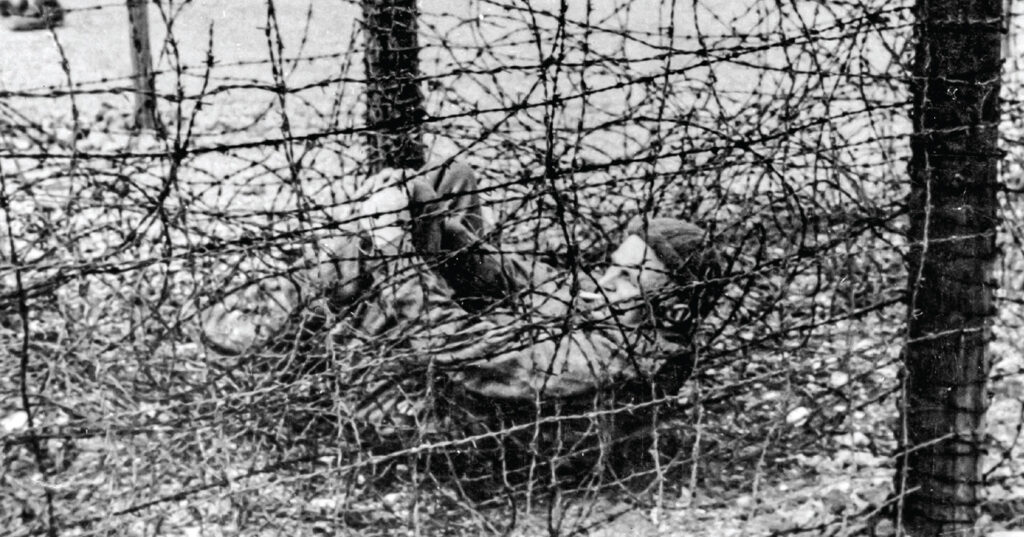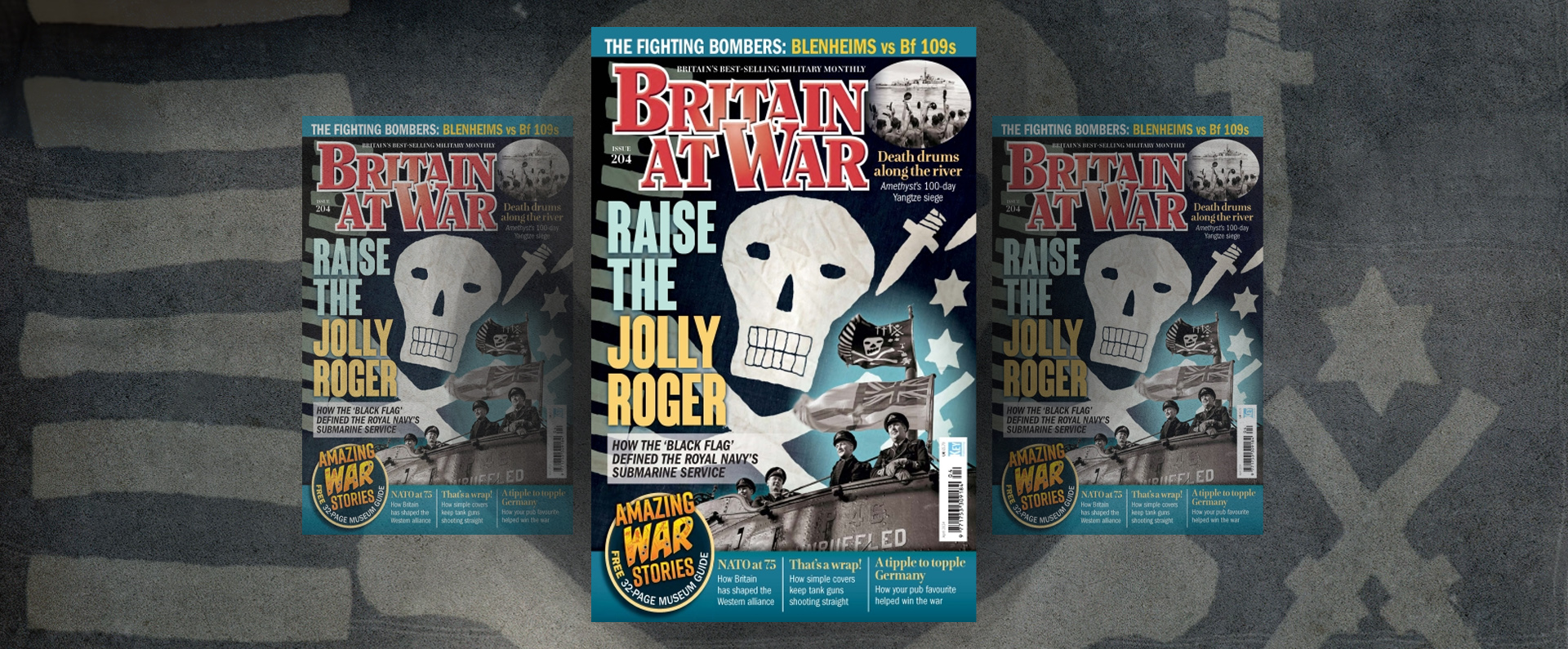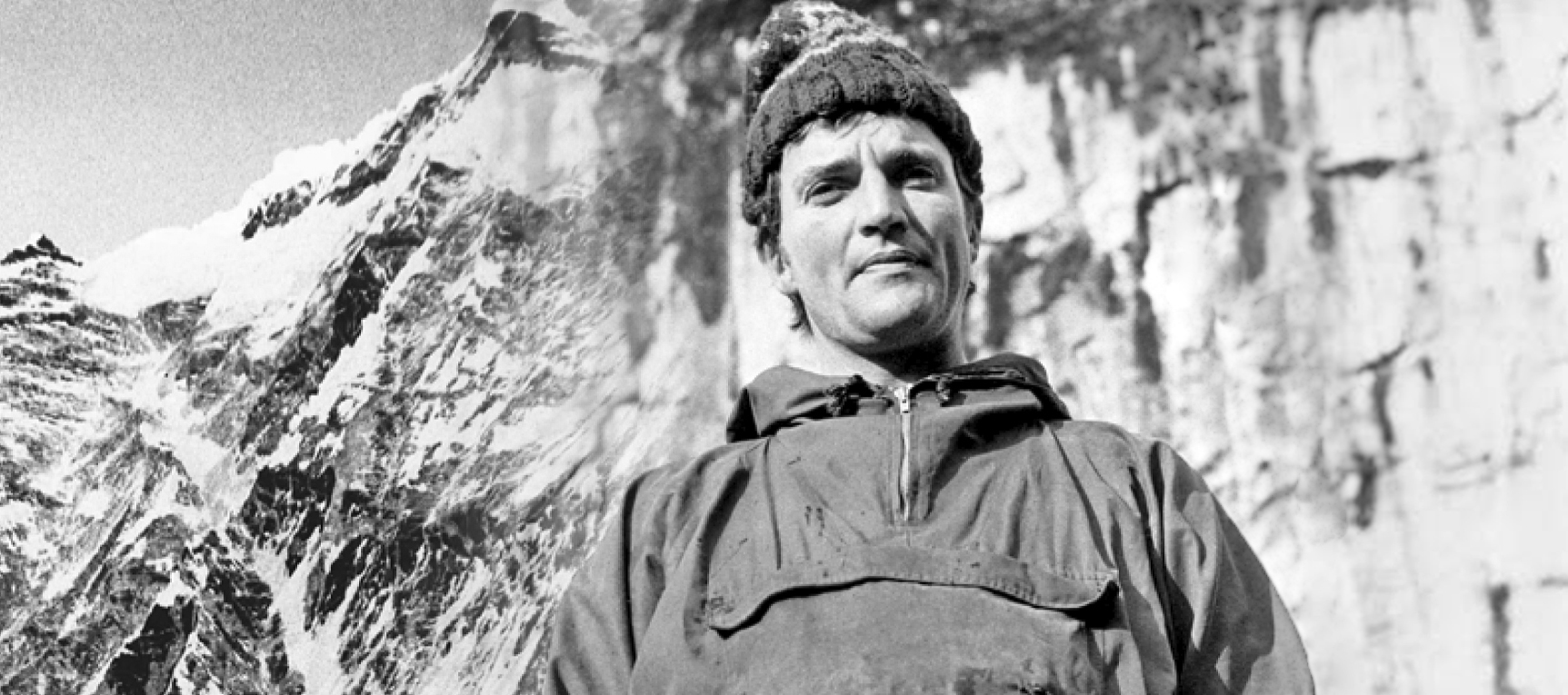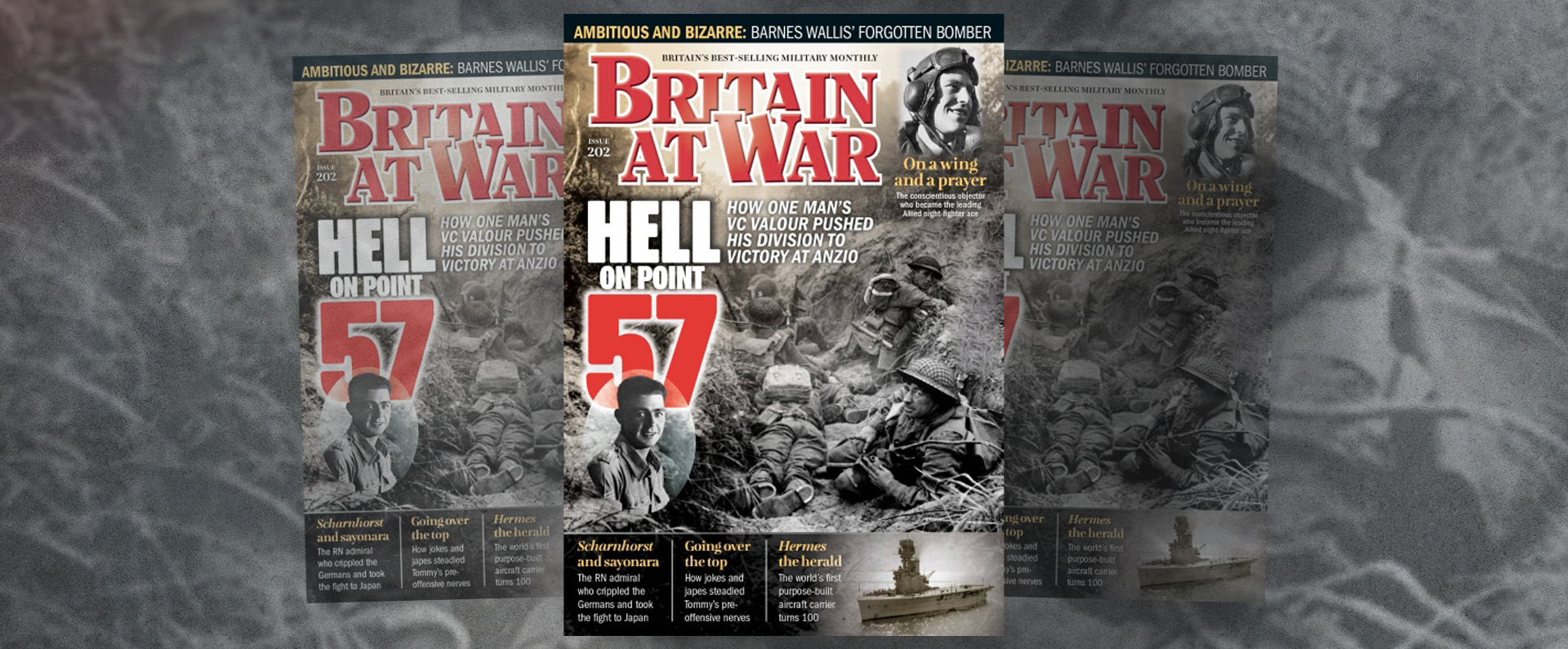
Published in Britain at War in September 2022.
Captain Charles Hazlitt Upham VC & Bar
In the 166-year history of Britain and the Commonwealth’s most prestigious gallantry medal there has only been one combat soldier who has been awarded the Victoria Cross (VC) twice. His so-called “VC and Bar” entitles Captain Charles Upham to be regarded as the greatest frontline soldier of modern times.
Like so many of the bravest men, Upham’s gallantry was matched by an extraordinary modesty. He felt deeply uncomfortable in the spotlight and when praise was heaped upon him.
This year marks the 80th anniversary of Upham’s second VC action although, due to unusual circumstances, it would be another three years before that gallantry in north Africa was officially recognised.
Charles Hazlitt Upham was born in Christchurch, New Zealand, on September 21 1908. One of three children and the son of a lawyer, John Upham, and his wife, Agatha, he boarded for ten years until 1927, first at Waihi School, Winchester, South Canterbury, and, later, Christ’s College, Christchurch. After leaving school and until the outbreak of war in 1939, he studied and pursued a career in farming.
Upham enlisted into the 2nd New Zealand Expeditionary Force in September 1939, just days after the outbreak of the Second World War. Of medium height, wiry and as tough as teak from his years as a farmer, he was eager to become the best soldier possible.
His discipline and skills saw him gain three promotions in 14 months, being commissioned as a second lieutenant on November 2 1940 and being given command of a platoon in his 20th Otago-Canterbury Battalion.
Having already served in Egypt, his next destination in March 1941 was Greece, only to be evacuated to Crete as the Allies were forced off the mainland. On May 20, the Germans launched an attack on Crete, which they saw as strategically important.
The airborne attack, codenamed “Operation Mercury”, saw fierce fighting along the northern coast of the island and Upham was, typically, soon in the thick of the action.
The lengthy citation for his first VC begins: “During the operations in Crete this officer performed a series of remarkable exploits, showing outstanding leadership, tactical skill and utter indifference to danger.” His daring exploits, when he was aged 32, began in earnest on May 22 when he led a counter-attack on Maleme airport which had fallen into enemy hands.
He and his platoon pushed forward nearly two miles with Upham leading from the front, including taking out at least three machine-gun positions using his pistol and hand grenades. The hand grenade soon became his weapon of choice but it carried dangers too as he liked to get to as close as 15 yards from an enemy position to get a perfect aim.
When his company was forced to withdraw, Upham carried a wounded comrade back under fire. A comrade who witnessed the incident said later: “Bullets and shrapnel were flying about. A chap walked out of olive trees and across open country. No shirt, shorts blood-smeared, carrying a badly wounded man. I said to my CSM [Company Sergeant Major], ‘He’ll either get a wooden cross or a Victoria Cross’.”
Next, Upham and a corporal ran some 600 yards under enemy fire to alert another company that it had become isolated. Killing two Germans on the way, he brought the company back before it was cut off.
For his actions that day alone, he deserved the VC but his citation goes on to detail more acts of outstanding gallantry. By this point he was wounded too, having come under heavy fire in an exposed forward position on May 23 and 24. He was blown over by one mortar shell and injured by a piece of shrapnel behind his left shoulder from another shell. He also received a bullet in one of his feet which he was unable to remove for the next fortnight.
On May 25, his platoon was forced to seek cover under a ridge from relentless mortar and machine-gun fire but Upham decided the best form of defence was attack. Launching a terrifying assault with gunfire and grenades, he and his men killed 40 more enemy soldiers and forced other enemy units to retreat.
Next, Upham again went to warn other Allied troops that they were in danger of being cut off but he was spotted by two Germans soldiers who fired on him as he ran off. He crawled for cover but was unable to fire his gun properly as he had been wounded in one arm.
When the enemy soldiers came looking for him to confirm they had killed him, his injury meant he had to rest his rifle in the fork of a tree to fire it. As the two men emerged, he shot them both dead despite having to reload with one arm. The second soldier was shot at such close-range that he hit the muzzle of Upham’s rifle as he fell.
It soon became clear, however, that the Allies, mainly British, New Zealand, Australian and local Cretan troops, would have to retreat from the better-equipped enemy force. Upham and his men prepared to be evacuated by boat from the south of the island.
However, before they could get off Crete they were ordered to confront an enemy unit that had advanced along a ravine. By this point exhausted and demoralised, Upham took a Bren gun and two riflemen to the top of the ravine. Using clever tactics to encourage the enemy to expose themselves, he shot 22 dead at long range and the remainder dispersed.
Incredibly, during these nine days of battle, Upham had been suffering from acute dysentery, which left him virtually unable to eat, on top of being wounded several times.
Upham was soon back on frontline operations joining the New Zealand Division in the Western Desert where he learnt on October 14 1941 he had been awarded the VC for his courage on Crete. He was only prepared to accept it on the basis it was on behalf of all of his men too.
Upham was promoted to lieutenant in November 1941 and to captain in May 1942. On June 27 1942, German forces attacked the division’s positions at Minqâr Qaim. Upham spent much of the day moving about in the open under heavy fire, checking on his men.
The next night Upham again led from the front during the famous break-out from Minqâr Qaim. During intense fighting he and his men used hand grenades to destroy an entire truck of German soldiers with Upham being wounded by the explosions.
On the night of July 14/15, the New Zealand Division attacked Ruweisat Ridge with disastrous consequences. Despite his earlier wounds and being initially part of the reserve battalion, Upham was soon on the frontline at what became the First Battle of El Alamein.
Just before dawn on the 15th, he led a successful attack on two well-defended enemy positions, personally destroying a tank, several guns and a number of vehicles with hand grenades.
However, at one point he was shot through the elbow by a machine-gun bullet which broke his arm. Undeterred he fought on, pushing forward to bring back comrades who had become isolated before helping to fight off yet another German attack.
Exhausted and weak from loss of blood, he was briefly treated at a Regimental Aid Post before returning to battle. Under a relentless artillery and mortar fire, he was wounded yet again, this time with serious shrapnel wounds to one of his legs. Unable to retreat, he was taken as a PoW.
Upham refused to allow German doctors to amputate his badly-injured arm without an anaesthetic, aware of how many comrades had died in agony in similar conditions. As soon as he was on the road to recovery, he plotted and attempted a series of daring escapes. Over two years, he spent much of his incarceration in solitary confinement for endless breaches of prison rules.
In October 1944, he became one of only a very few New Zealand combatants to be sent to Colditz, the notorious prison for dangerous and habitual escapers. It was here that the Americans liberated him and others close to the end of the war.
From here, he was transported to Britain where his New Zealand girlfriend, Molly McTamney, was working as a nurse. Reunited, the couple married in Hampshire on June 20 1945. Upham returned to his homeland in September and his bride followed two months later.
Evidence was soon mounting that Upham deserved a second VC for his gallantry in north Africa in the summer of 1942. George VI, who had invested Upham with his first VC on May 11 1945 at Buckingham Palace, questioned Major-General Howard Kippenberger whether the second VC was really deserved.
The New Zealand general, affectionately known as simply “Kip” replied, “In my respectful opinion, Sir, Upham won the VC several times over.” The Bar to his VC was announced on September 26, 1945. To this day, the VC and Bar has only been awarded to two other men, both medics.
When a grateful nation raised £10,000 to buy Upham a large farm in late 1945, he politely declined the offer, uncomfortable at being singled out for preferential treatment. Instead, at his request, the money was used to create a charity enabling the children of servicemen to study at college or university.
However, using a government rehabilitation loan, Upham did eventually buy his own farm north of Christchurch. He and Molly also had three daughters, including twins. For years, his daughters grew up unaware their father was a decorated war hero: they only learnt about his exploits when they attended boarding school.
In 1994, frail and still suffering from his wartime injuries, Upham left the farm that he had been his pride and joy for 47 years. He and Molly settled into a new life in a retirement village in Christchurch. Just seven months later, on November 22 1994, Upham died surrounded by his wife and daughters. He was 86.
His state funeral at Christchurch Cathedral saw 5,000 people line the streets and later his ashes were buried in a modest family plot at St Paul’s Church, Papanui, a suburb of Christchurch.
In November 2006, Upham’s daughters sold their father’s medal group to the Imperial War Museum in London for an undisclosed sum. However, his gallantry and service medals are on permanent loan to the National Army Museum at Waiouru on New Zealand’s North Island.
Of all the numerous tributes to Upham, my favourite is this short note that accompanied his portrait in a book about the prisoners of Colditz. It read simply: “Captain C.H. Upham, V.C. & Bar. New Zealand Military Forces. An officer and a gentleman – determination and singleness of purpose personified – loyal, constructive, quiet, unassuming and friendly.”
Download a PDF of the original Britain At War article.
For more information, visit:
LordAshcroftOnBravery.com


